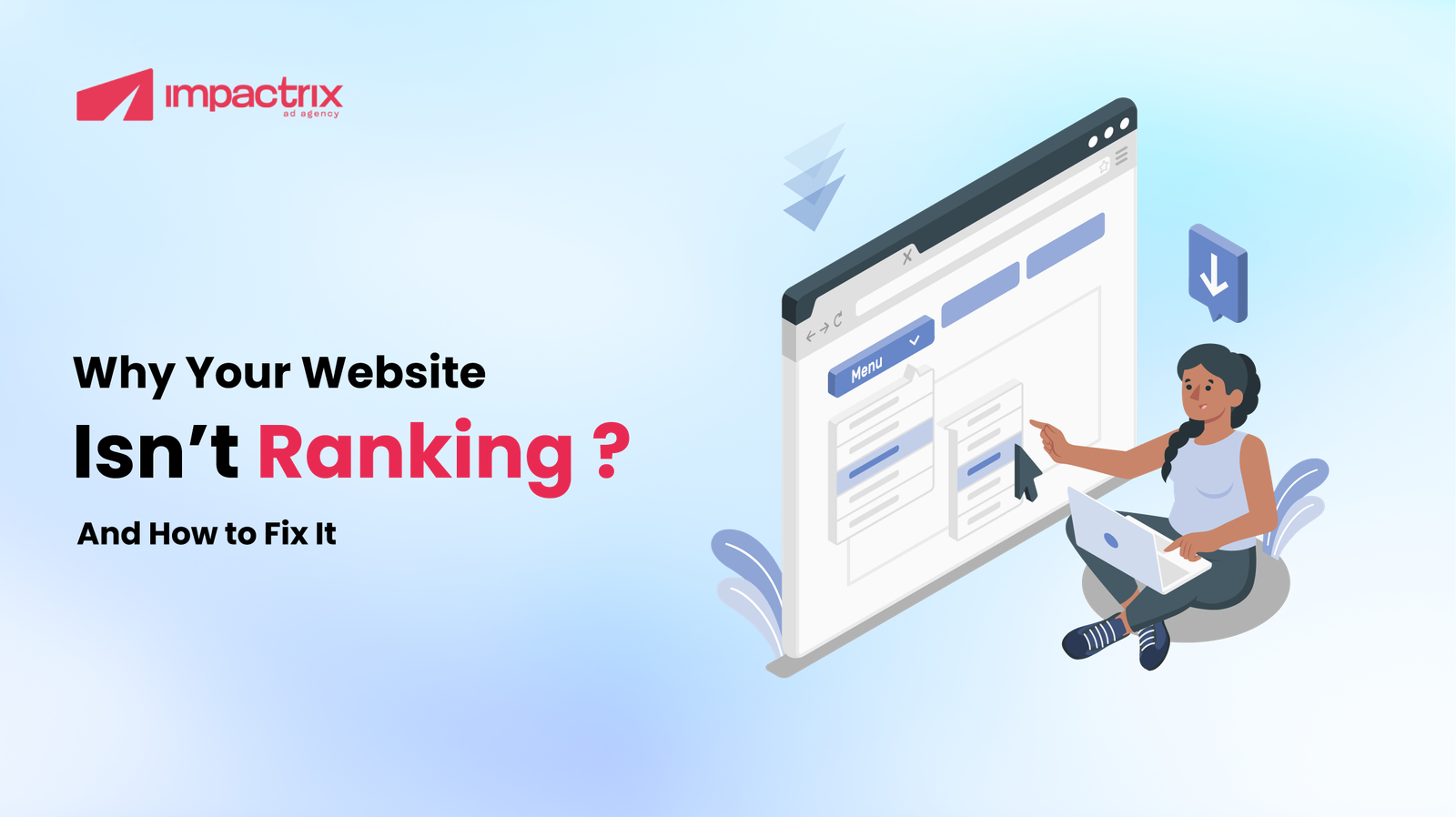
Why Your Website Isn’t Ranking—And How to Fix It
An Introduction To: why your website is not ranking In Google
A significant and sudden drop in your Google rankings can create feelings of rage and fright. It’s especially terrifying if you have no idea why your website is not ranking in google or the ranking dropped so suddenly.
With 200+ Google ranking factors, there are a multiplicity of reasons why a site’s Google ranking might suffer an abrupt plunge. If your Google rankings dropped overnight, it doesn’t have to be permanent. Luckily, a majority of Google ranking issues can be remedied with a bit of time and effort. However, if your Google rankings drop overnight, it may take anywhere from months to years of significant effort to fully recover the lost ground.
But, don’t despair!
Recovery from a sudden drop in Google rankings is possible! Let’s look at some of the most common issues that could cause a site’s search engine ranking to plummet AND how you might fix them.
Search engine optimization (SEO) is filled with questions, including, “Why isn’t my website ranking?” There are plenty of reasons a website isn’t ranked, from indexing issues to content problems and other SEO challenges. If you’re dealing with a website not ranking, here are some potential causes and solutions:
Why your website is not ranking?– Here is what you need to know
- Indexation
Indexation is one of the most common reasons for why your website is not ranking in search results. If you want to appear in search results, you have to enter a search engine’s index. That’s why we recommend checking for indexing issues first when troubleshooting a non-ranking website.
A quick way to test for index issues is to perform a site search in your Internet browser, such as using the query site. Your results will show which pages Google has in its index. Alternatively, you can visit Google Search Console, enter your affected URL, and view its index status.
New sites get a lot of love from Google. And a lot of hate. It’s complicated. When your site launches, Google will have never heard of it, and it won’t have your site indexed, which means you can’t show up in any search results.
When Google first indexes your site, the Google algorithm might give you an artificial ranking boost (since Google’s algorithm naturally favors new sites temporarily), leading you to believe you’ve earned those ranks all on your own.
After that introductory period, your rankings will probably drop again as Google tries to make better sense of who you are and how authoritative you are.
If your site is less than five years old, chances are there will be much more volatility than other established websites, regardless of other factors like your link profile, internal linking structure and site dwell-time.
Remember, new websites compete with authoritative brands that have been on the internet for a very long time (some more than 30 years).
Don’t expect to beat them with a few links and some well-written copy. AI can likely do it better!
There are a few types of index issues, including the following:
Noindex: A noindex directive tells search engines not to index a page.
- Robots.txt: A robots.txt file tells search engine spiders if they can crawl a site, folder, or page.
- You can fix the above issues by updating your robots.txt file and noindex directive. How you fix these issues specifically will depend on your website setup. If you use a tool like Yoast SEO, you can resolve this problem without a developer.
- Website penalty
While rarer, a website penalty from Google can also remove your site from search results. Log in to Google Search Console to see if you have a penalty. If you do, Google will provide instructions on what to do next. Problems with canonicalization are somewhat similar to issues with duplicate content.
- These problems crop up when Google has indexed a page from your site with multiple different URLs.
- Canonicalization issues can occur when two versions of a domain name are indexed or when a single domain name is indexed with both HTTPS and HTTP.
- Unfortunately, this type of problem is easy to encounter through no fault of your own.
- Anyone who links to your site with an incorrect version of the URL can cause canonicalization trouble for you.
- If this happens, it’s important to reach out to the webmaster of the site with the bad link and attempt to have it changed.
- Time
Time is another factor to consider when asking “why isn’t my website ranking.” If you expect non-news content published a few hours ago to appear in search results, prepare to shift your expectations. Typically, content will take a few weeks to a few months in some instances to rank (and rank well) in search results. Unfortunately, this issue doesn’t have an immediate fix.
- Search intent
Search engines aim to deliver users the most helpful and valuable content based on their searches. That’s why content that doesn’t meet search intent doesn’t rank. So, analyze your target keyword’s search intent by reviewing the first three to five URLs and comparing them to yours.
If your content falls short, address the content gap and resubmit your URL to Google.
- Keyword competition
The competitiveness of your keyword targeting can also contribute to your website not ranking where you’d like it to.
Businesses often face ranking issues when they target high-competition keywords using a website that has a weaker backlink profile. That’s why we recommend solving this issue by pivoting your keyword targeting to lower-competition, long-tail keywords.
You should consider doing some keyword research using keyword tools from Semrush, Moz, etc. to review and update your keyword strategy.
- Backlink profile
As one of the most influential ranking factors, your backlink profile can affect your website’s ability to rank in search results. While your backlink profile won’t prevent you from ranking, it will influence how well you can rank for keywords.
Tools like our free backlink checker, Moz, Ahrefs, and Semrush all include custom metrics for measuring your backlink profile’s authority. Based on their score, you can gauge which keywords your business can successfully target and rank for in search results.
Besides changing your keyword targeting strategy, you can also build your backlink profile.
The best strategies for link acquisition focus on creating great, original content, which can include:
- Infographics
- Guides
- Tools
- Research
- And more
Link building is hard, but it’s essential to ranking in search results.
- Thin or duplicate content
Another reason why your website isn’t ranking on Google relates to your content.
To troubleshoot this potential issue, we recommend a site crawl with Screaming Frog, free for up to 500 URLs. Screaming Frog will generate a thin and duplicate content report, which you can review.
For duplicate content, there are a few options:
- Create original content for the duplicated page
- Redirect one of the duplicated pages
- If you have thin content, seek ways to enhance its helpfulness, such as by adding more informative material.
8. On-page optimization
If none of the above reasons fit your page, check its on-page optimization for knowing why your website is not ranking:
- Unoptimized title tags, meta descriptions, and headings
- Poor formatting with long paragraphs and grammar errors
- Keyword stuffing
- Based on your on-page SEO audit, you can make any necessary updates and re-submit your URL.
9. Algorithm update
In some cases, search engine algorithm updates can also be responsible for your website not ranking.
Tools like Rank Ranger, Semrush Sensor, and Cognitive SEO can help you monitor the impact of an algorithm update. If you’re practicing white-hat SEO and taking a user-first approach to search engine optimization, it’s unlikely you’ll see a dramatic impact from an algorithm update. If you do, though, check out Google’s official documentation for more guidance.
Fix your website’s ranking issues with Impactrix
Don’t let ranking challenges hold you back. Our expert team can help you identify and resolve SEO issues to enhance your website’s performance. Contact us online today to learn why your website is not ranking!
